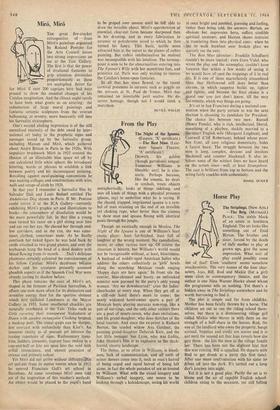From the Play
The Night of the Iguana. (Empire, 'X' certificate.)
—The Best Man. (Leic- ester Square Theatre, 'A' certificate.) DESPITE his golden (though garrulous) tongue, Tennessee Williams is filmable; anzi, he is cine- matic. Perhaps because, like the cinema, he deals in symbols, treats objects metaphorically, looks at things sidelong, and uses all kinds of things with a physical presence (places, say) to underline what he is saying. If the chased, trapped, imprisoned iguana is a sym- bol of man straining on the end of an invisible yet choking rope, what better than the cinema to show man and iguana fleeing with identical panic through the jungle,
Though set exotically enough in Mexico, The Night of the Iguana is one of Williams's least exotic plays: least far-fetched, least full of laughter at the wrong moment. No cannibalism, incest, or other rarities turn up. Of course the situation is bizarre, but Williams's world would not be recognisable without, at least, bizarreness. A busload of middle-aged American ladies who address the others collectively as 'girls' bowls along the scorching Mexican roads singing 'Happy days are here again.' In front sits the courier, blue-chinned and boozy, an unfrocked minister now pursued by the party's only young woman. 'Are we downhearted?' cries the ladies' cheerleader at every stop. When they get off at a cliff-side hotel there's more to come: the newly widowed hotel-owner sports a pair of Mexican boys, playing maracas non-stop, like a pair of ear-rings, and the only other visitors there are a poet of ninety-seven, who does recitations, and his grand-daughter, who does sketches of the local tourists. And since the ex-priest is Richard Burton, the tousled widow Ava Gardner, the painting grand-daughter Deborah Kerr, and the hot little teenager Sue Lyon, who was Lolita, John Huston's film is as explosive as the thick- leaved, steamy landscape.
The theme, as 'so often in Williams, is loneli- ness, lack of communication, and all sorts of minor themes come into it, such as man's hatred of being caged and equal hatred of being left alone, in fact the whole paradox of sex as treated by Williams. What with the visual imagery and Williams's verbal imagery, one seems to be looking through a kaleidoscope, seeing his world
at once bright and jumbled, guessing and feeling, rather than being told, the answers. ,Burton, an obvious but impressive hero, suffers credible spiritual torments, and Huston shows restraint in translating them into physical ones: when he has to walk barefoot over broken glass we scarcely see the cuts.
The Best Man (director: Franklin Schaffner) couldn't be more topical: even Gore Vidal, who wrote the play and the screenplay, couldn't have foreseen that within a few weeks of seeing it we would have all seen the trappings of it in real life. It is one of those marvellously streamlined films that Hollywood still does better than anyone, in which suspense builds up, tighter ,and tighter, and because the final choice is a
last one you just don't know, till the very ast minute, which way things are going.
It's set in San Francisco during a national con- vention when the party certain to win the next election is choosing its candidate for President. The choice lies between two men : Russell (Henry Fonda), who is rich, intellectual, liberal, something of a playboy, shakily married to a 0o-smart English wife (Margaret Leighton), and Cantwell (Cliff Robertson), behind whose poor- boy front, all cosy religious domesticity, hides a fascist beast. The struggle between the two men is long, complex, devious and involves blackmail and counter blackmail. It also in- volves some of the wittiest lines we have heard on the screen since—well, at least Strange/ave. The cast is brilliant from top to bottom and the acting fairly crackles with authenticity.
ISABE„L QUIGLY






























 Previous page
Previous page